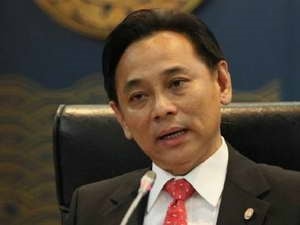Thai Prime Minister dismisses Commerce Minister
On June 30, Thai Prime Minister Yingluck Shinawatra decided to dismiss Commerce Minister Boonsong Teriyapirom amid public criticism of the rice purchase program - a program that has caused great damage to the state budget and caused this Southeast Asian country to lose its position as the world's largest rice exporter.
On June 30, Thai Prime Minister Yingluck Shinawatra decided to dismiss Commerce Minister Boonsong Teriyapirom amid public criticism of the rice purchase program - a program that has caused great damage to the state budget and caused this Southeast Asian country to lose its position as the world's largest rice exporter.

Thai Commerce Minister Boonsong Teriyapirom. (Photo: Bangkok Post)
Niwatthamrong Bunsongphaisan, who once headed the Shinawatra family-owned iTV channel but has since been dissolved, will replace Boonsong as commerce minister.
In addition, Mr. Niwatthamrong also holds the position of Deputy Prime Minister.
Despite removing Mr. Boonsong, Prime Minister Yingluck kept Mr. Kittirat Na Ranong as Finance Minister and Mr. Nattawut Saikua, who recently actively defended the rice purchase program, as Deputy Commerce Minister.
The Thai government began implementing a rice purchase program in October 2011, with a fixed purchase price of 15,000 baht per ton of rice, to increase income for farmers. However, this program is controversial in Thai public opinion as some say that this program is wasteful, only creating conditions for corruption and rice smuggling.
The Bangkok Post reported on June 18 that the Thai government spent about 352 billion baht to buy 21.7 million tons of rice in the 2011/12 crop year. They sold some of this rice for a total value of about 59.2 billion baht.
The value of the remaining rice stock (based on the price of rice on January 31) is 156 billion baht. The Thai government admitted that the temporary loss from the above program is 136 billion baht.
Along with the losses, this program has caused Thai rice export prices to skyrocket and reduced the competitive advantage of Thai rice in the international market. This is the main reason why Thailand lost its position as the world's leading rice exporter to India last year when it exported only 6.9 million tons of rice, a sharp decrease compared to 10.6 million tons in 2011.
On June 3, Moody's Investors Service Inc. warned that this situation could hinder Bangkok from achieving its goal of balancing its budget in 2017 and negatively impact the country's credit rating.
In that context, on June 19, the Thai Government decided to reduce the subsidy for rice growers under the rice purchase and storage program. Accordingly, from July 1, 2013, the Thai Government will only pay 12,000 baht (390 USD) for 1 ton of paddy, a 20% reduction compared to the purchase price that has been applied since the beginning of the program (15,000 baht/ton). However, this decision has met with strong reactions from many farmers./.
According to (TTXVN) - DT






